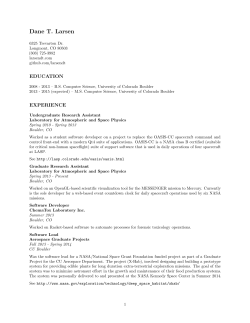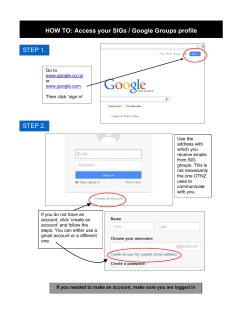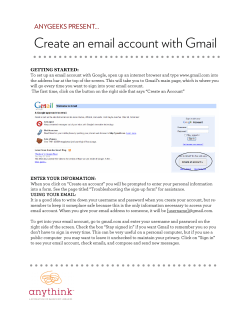
—NOT FINAL! ICEE ONLINE COURSE SAMPLE SYLLABUS
ICEE ONLINE COURSE SAMPLE SYLLABUS—NOT FINAL! Climate Instruction 101: Essential Knowledge and Teaching Strategies Contact hours: 12 weeks Tasks Large group webinar Small group interaction Reading, Enactments, Writing Total contact hours Total hours Avg Hours 1 Weeks 12 Total hours/task 12 2-3 12 33 2-3 12 24-36 3-4/ week 12 45 5-7/ week 12 69-81 Introduction: Welcome to Teaching Climate 101! Susan Buhr, Deb Morrison and Emily Kellagher, are your instructors for this 12-week, on-line class. The class will include other participants such as climate scientists who will be available to answer questions and teachers experienced in teaching climate change who are willing to share their experiences and knowledge. The purpose of this class is to: Learn climate science content relevant for your teaching needs, Build and test useful curricula for your classroom that addresses student needs, Address alternative conceptions using high quality resources, Develop strategies that work within your classroom context, including addressing any controversy, and Foster a professional learning community around climate education. The curriculum is designed to facilitate an online collaborative environment, so your participation in the weekly class session and in the online discussion boards is an important part of the class. In addition, this course has an enactment component where you will deliver the lesson you design during the course and reflect on this experience. Once you complete the class, you will have the knowledge and skill base to develop future lessons for your students, you will have implemented at least one climate science based lesson, and you will be connected with a professional learning community of teachers interested in integrating climate science into their curricula. We are looking forward to a productive 12 weeks. This course is supported by NASA Innovations in Climate Education program and the Continuing Education Program at the University of Colorado, Boulder. Instructor Contact Information: Instructor: Susan Buhr, Cooperative Institute for Research in Environmental Sciences (CIRES), University of Colorado, Boulder. gmail: buhr.susan@gmail.com Phone: 303-492-5657 Skype: sunnygreen80401 Instructor: Deb Morrison, School of Education, University of Colorado at Boulder gmail: 2debmorrison@gmail.com Phone: 303-520-2384 Skype: educator.deb Instructor: Emily Kellagher, Cooperative Institute for Research in Environmental Sciences (CIRES), University of Colorado, Boulder. gmail: emilykellagher@gmail.com Phone: 303-492-5520 Skype: emily.kellagher Hours: As this class is online, we are available to host virtual office hours either via skype or phone. Please email the specific instructor you wish to speak with to set up a time to meet or talk over the phone. We will return your messages as soon as possible. Course Description: This online course will provide both content and experiential learning opportunities. We will provide content support for everyone on the seven Essential Principles of Climate Science. The publication Climate Literacy: The Essential Principles of Climate Sciences provides a well-vetted, authoritative overview of the fundamental concepts of climate science. A sister project, the Climate Literacy & Energy Awareness Network (CLEAN) (http://cleanet.org) offers a catalog of high quality resources and teaching tips that we will tap. Concepts of climate science are found in science education standards and benchmarks, but have not traditionally been emphasized as much as related concepts, like weather. However, the draft Next Generation Science Standards do include climate change, human impacts and sustainability, engineering and information literacy concepts. As part of the course, we will ask you to examine both national and your own state standards to locate where climate science exists in your specific standards documents. We will have one large group weekly telecom/webinar about the weeks’ topics, upcoming homework, and other information for that week. This event will be recorded and archived for those who are unable to attend. This will occur on a day and time that suits the most participants. Sunday evenings have worked well for other similar courses, but participant preferences will be taken into account. The experiential learning component of this course will occur online in small groups formed around similar teaching needs and similar climate regimes. Small groups will collaborate on similar topic lessons. While each teacher will be responsible to produce their own lesson, deliver it in their classroom and reflect on the experience, the professional learning community approach we are taking in this course will ensure that teachers with similar resource needs and interests work together in this process. Finally, specific content modules, described below, will be provided online. Your content emphasis will be based on your prior knowledge and your teaching needs. Content modules will allow participants to engage in online discussions of course materials such as the readings, video lectures, and other media and identify common student alternative conceptions to be addressed in the classroom. All course assignments are required. Course Objectives: Upon completion of the course, participants will be able to: Integrate Essential Principles of Climate Literacy into existing curricula or other educational programs Assess common misconceptions about climate science and climate change and use strategies to help students overcome them Explain concepts underlying each of the 7 Essential Principles of Climate Science and the interrelationships between these concepts Locate and identify high quality resources for creating climate science lessons Become engaged with a community to support climate learning and stay up to date in the field. Required Readings: The Essential Principles of Climate Science Literacy (USGCRP, 2010) IPCC Frequently Asked Questions (FAQ) State and district standards Various readings from journals, news sources or internet sites posted in the online forum. Assignments specific to each module of the course will direct students to additional resources. All resources will be available online. For the on-line discussions, participants will be directed towards specific discussion boards. Course Schedule: The course is divided into nine modules and the lesson project. Students should plan to spend about 2 to 3 hours working on each module per week and an additional 2-3 hours on the lesson project each week. Your module activities during this time will include reviewing required readings and resources, completing writing assignments, and engaging in online discussions. Course project activities will include collaborating with other teachers, researching resources, and lesson plan development, enactment and reflection. Small groups will collaboratively work on lessons around similar topics. While each teacher will be responsible to produce their own lesson, deliver it in their classroom and reflect on the experience, however, the professional learning community approach we are taking in this course will ensure that teachers with similar resource needs and interests work together. Lessons will include a lesson plan, all associated teacher and student worksheets, lists of digital resource links, references or copies of reading materials, samples of de-identified student work from the enactment of the lesson, and a written reflection on the lesson development and enactment including responses to prompts provided. All lessons will be made freely available via the University of Colorado’s Outreach website with authors of the lessons identified if desired. Students are responsible for completing each week’s work by the completion dates indicated below. The class schedule will allow you to maximize your learning and will enrich class discussions. Also indicated below is the date on which the module for the week will be posted on the course website. Week Date Posted Activity or Module Completion Date (Due Date) August 26 0: Self-Assessment: Content knowledge, classroom context, lesson plan ideas. Purpose to determine personalized learning plan and to assign small group assignments. Participants draft list of what they need to know and be able to do. Sept 1 1 No class meeting September 2 due to Labor Day Holiday. 2 Instructors will set up small groups based on similar teaching needs September 4-8. September 9 Module 1: How scientists know what they know, evidence-based instruction Review EP 5 Our understanding of the climate system is improved through observations, theoretical studies, and modeling. September 15 Lesson prep: Small groups brainstorm topics, write reflections on NOS, use of data, evidence and inquiry. 3 Module 2: EP1 Sun/Energy Balance Alignment with standards and curriculum September 16 Understand EP1 and anticipate difficult concepts for students. Lesson prep: Identify local elements of the topic of the lesson, establish standards alignments, learning objectives, draft initial ideas for lesson plan, and outline summative assessment ideas. September 22 4 Module 3: EP2 Complex interactions within the climate system September 23 Understand EP2 and anticipate difficult concepts for students. September 29 Lesson prep: Finding and identifying high quality resources. Small groups start populating lesson plan template, identify list of resources to draw from. 5 Module 4: EP3 Life on Earth depends on, is shaped by, and affects climate. September 30 6 October 7 7 Understand EP3 and anticipate difficult concepts for students. October 6 Lesson prep: Review common misconceptions related to lesson plan topics and develop strategies to address these within instruction. Module 5: EP 4 Climate varies over space and time through both natural and manmade processes. Lesson prep: Detail formative and summative assessments that will be used to determine student learning. October 13 Module 6: EP6: Human activities impact the climate system October 14 8 October 21 9 Lesson planning: Assess the likelihood of controversy or resistance from students or community. Develop plan to forestall or address any controversy. Module 7: EP7 Climate change will have consequences for the Earth system and human lives. October 20 October 27 Lesson planning: Identify local experts and make connections with local communities. Module 8: Guiding Principle for Informed Decisions: Humans can take actions October 28 Incorporate solutions and decision-making into instruction. How to integrate social aspects such as economics, values, justice? November 3 10 11 November 4 November 11 Work time in small groups for lesson finalization. November 10 Lesson may be delivered this week. Lesson may be delivered this week. Final Project Draft – Lesson development November 17 Sharing Out – Virtual Lesson Plan Walk 12 November 18 Reflection Assignment on Virtual Lesson Walk Final Project Completed project - Lesson development, delivery and reflection. November 20 (end mid-week) Student Expectations: Participants are expected to fully participate in required coursework, online discussions and to complete the course project by November 20. Please note that you will be expected to post your written assignments to the online discussion board for the class to read and discuss. Grading: Grading will be broken-down module by module. The percentage breakdown for each module is as follows: Module 0: 10% Modules 1 through 8: 5% each for a total of 40% Lesson Development, Enactment and Reflection: 45% Lesson Walkthrough: 5% More details on each module's grade breakdown will be given on the module's assignment sheet.
© Copyright 2025





















